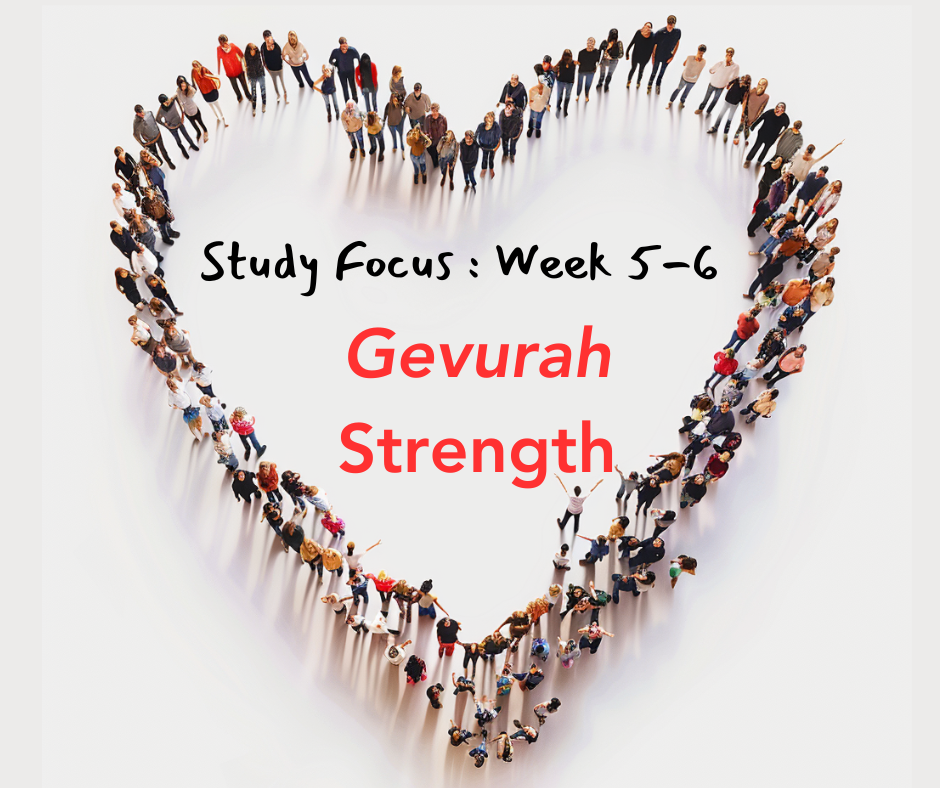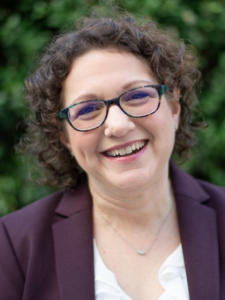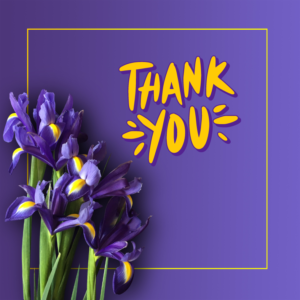
Omer Essay WEEK #5: Harnessing Inner Strength
There are personality assessment tools that companies and organizations use to discover each person’s strengths and motivations to better balance out a team’s productivity and efficiency. It can also be helpful to know what your own ideal work environment looks like or what challenges you could possibly expect. My results have always been fairly consistent. I am an INFJ in the Myers-Briggs system; a 9 on the Enneagram scale (Peacemaker). When I took the VIA assessment a few months ago, I was delighted to learn that I had taken the same test in 2005 and that my signature strengths were exactly the same now as they were then: Love of Learning, Gratitude, Curiosity, Honesty, and Spirituality – and in that same order too!
I consider Passion to be one of my core strengths, although it’s not listed on any of these popular assessments. I have been pondering how best to use my passion in conversation or in my classes. There are certainly ways that passion can be “too much” or could lead to taking on too many projects (guilty as charged). And there are many occasions when I feel that I need to tamp down my true self, when too much heart might be taken for juvenile enthusiasm or naiveté.
To move beyond the mundane confines of our world and grasp the remarkable, we must be ready to surpass our usual human limitations. This demands a level of effort and exertion that does not always come naturally to our species. Ironically, we often turn to the vitality and intensity of the animal kingdom as inspiration for transcending our own inertia. We can use the inner strengths of nature as our guide.
In Pirkei Avot 5:23, we read: Judah ben Tema said: "Be strong as a leopard, and swift as an eagle, fleet as a gazelle, and strong as a lion, to do the will of your Father Who is in heaven." From this, we learn that these inherent attributes are to be used for serving God. Strong like a leopard -- to be courageous in defending who you are and in acting against evildoers. Swift as an eagle -- to run away from sin and to be free from sluggishness or physical pleasures. Fleet as a gazelle -- to be quick to prioritize our responsibilities. Strong as a lion -- to conquer one’s negative tendencies and to be firm in our obligations.
This week and next, we will be working with the middah of Gevurah/Strength. Gevurah can mean taking an accurate self-assessment, setting boundaries, and moving forward with specific steps. It can also include re-claiming or restraining an aspect of yourself.
One thing that is always included in my personality test results is something about being “the rarest of the personality types.” This has me thinking about why I would ever want to downplay one of my natural strengths. Shouldn’t I embrace who I naturally am and claim it as a superpower? If I am so exceptional that less than 1% of the population has these exact strengths, shouldn’t people be clamoring to have me around their tables? OK, that may be going a bit too far, but I’ve decided to stop apologizing for my quiet approach and simply embrace who I am. I can fine-tune it with restraint. Indeed, that is what we are each doing in this Omer Challenge – fine-tuning ourselves.
We have come to a turning point for Jews in Israel and in the diaspora. This year, in the face of new trauma, grief, and divisions, it feels even more important than ever that we protect ourselves as a Jewish community and as Jewish individuals. Anti-Zionists are attempting to restore a conditionality to the Jewish experience. Some Jewish students do not feel comfortable in general spaces on campus right now and are self-segregating. Israeli Jews are feeling an extreme sense of urgency. Despite these current vulnerabilities, the Jewish community remains the freest Jewish community of any time period in history. We must take advantage of this moment to urge our fellow Jews to return to embracing their Jewish identity and to find meaning in the Jewish story, not as an obstacle to acceptance but as a new kind of freedom.
We are currently living in a grey area where we lack clarity. Jews were the victims of 2000 years of oppression. Today, we are stigmatized, but not permanent victims. We are also responsible for how we use power, and at the same time we are not victimizers. It is very important to determine where the boundaries will be, as individuals and within our communities. We need not agree on every detail, but we must make room for the idea that the Jewish people are one family. We can celebrate difference at the same time that we promote the importance of k’lal Yisrael, the value of uniting the whole Jewish community.
At this stage in our Omer Challenge, consider creating a way to implement a new habit or commitment so that you naturally integrate it into your daily living. The newer it is for you, the more structure you’ll need. If you’re looking to integrate something into your life, you actually need to find ways to program it in. For example, if you resolved to do more creative projects, you will need to have supplies available and nearby to spark your interest. If your goal is to bring more order into your life, you will need to create repeatable calendar entries for yourself as reminders to take action on your important priorities. And if you aimed to foster a sense of community, perhaps you schedule one time each week to touch base with certain people to get to know them better. I urge you to notice what middot are most salient for you and determine how you can use them to further your goal.
Gevurah is also about setting boundaries. Part of creating order is deciding what you will say “no” to, what will not be part of your daily routine. For me, using Gevurah to implement my Omer goal means directing my energy toward the most meaningful actions that engage my passions, and being careful about doing too many extraneous tasks, as much as I’d love to. If you decided to stop allowing your age to be a limitation, then when that thought occurs to you, there must be another thought in place to push it aside. I hope to remember that saying no to something actually means saying yes to something better. To remind yourself of any intangible concept, perhaps you have an evening ritual of recording in a diary whether or not you were successful and what was helpful. Your goal will foster a sense of purpose, fulfillment, and connectedness, but you must use Gevurah to prioritize.
The Torah models having certain fundamental consistent things in place and gives us permission to figure out the rest along the way or at your destination. In Pirkei Avot (ch. 2) we learn: “It is not your duty to finish the work, but neither are you at liberty to neglect it.” You may not have the full picture when you start out, and that is okay! What is important for now is that you take the first step. As our Mussar teachers remind us often, what is most important is that we are on a path, heading towards our destination.
Your destination can be anywhere and anything. Please email us at helaine@mussarinstitute.org and share your goal.
 Blessings for the journey,
Blessings for the journey,
Naomi
Naomi Wittlin attributes her renewed interest in Jewish learning to studying Mussar with The Mussar Institute for almost ten years. She is a Manchim Program graduate, completed the Advanced Facilitator cohort with Julie Dean, and co-facilitates a va’ad in Houston, TX. She traveled to Israel four years ago with TMI. Naomi recently completed her Masters in Jewish Studies at Gratz College and is currently a rabbinical student at the Academy for Jewish Religion in New York. She is a writer, mother, and mixed-media artist and incorporates themes of Jewish texts into her artwork. She has an amazing 15-year-old daughter and a supportive husband of 22 years. She is a dedicated student and facilitator of Mussar whose passion is watching people grow toward their spiritual potential and make lasting transformations in their lives. You can find her spiritual reflections, artwork, and monthly book reviews at poeticaperture.com.
Questions for Reflection:
1. Think about who you wish to become. What is one small active step you can take in that direction?
2. What is your personal WHY, your kavannah/intention?
3. Can you identify a self-limiting belief that you have been wanting to let go of?
4. Ask yourself: How can I be more present and engaged in my daily life?
5. Is there a way I can better honor myself or others in my life? What might that look like?

Special Dedication:
This week’s Omer Challenge on the theme of Inner Strength is dedicated to those who are harnessing their inner strength by attending the Mussar Institute’s In-Person Retreat from May 19th-23rd. The Retreat’s theme is “Reaching Towards Compassion, Fulfilling the Soul’s Need in Times of Conflict.”
Rachamim/Compassion is the first of God’s attributes listed in Exodus 34:6-7 and we are told that just as God is compassionate, so must we strive to be compassionate (Sifre Deut. 49). Few would disagree with the obligation to show compassion, yet it so often seems in short supply or mis-directed. And despite our own best intentions, it can be unclear what form our compassion should take or know who is or is not deserving of it. Or whether or not everyone is deserving of at least some? Those privileged to attend the Retreat studied and struggled with these issues, and followed Hillel’s directive that to learn the essence of Torah one must go and study.
